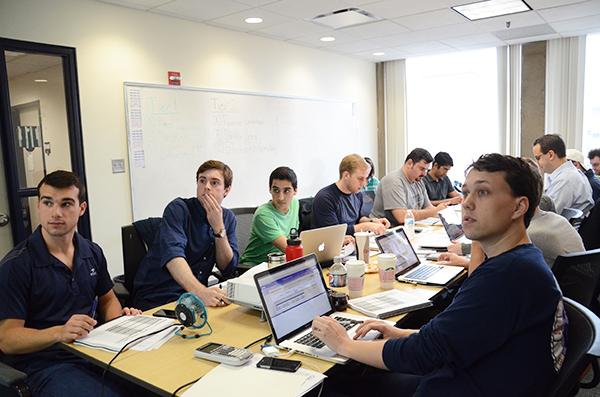
For more than 16 hours last weekend, a dozen students squeezed around a table in the Marvin Center and pored over budget requests for about 300 student organizations, all pressed neatly into binders.
By next week, the finance committee will have handed out $900,000 from a pool of University and student fee money. That process is far more detailed than years past, with members combing through hundreds of itemized budget requests – such as office supplies, food for events and space rental fees – rather than approving large chunks of money for a list of purposes.
“They’re doing their homework. You can’t argue with a good budget,” Ryan Counihan, chair of the committee, said about one performance group, as the committee approved a roughly $1,600 budget. Parsing through the requests for one event, he pointed out unavoidable fees like police officers and space rental, but said the group could fundraise for costumes and other set materials on their own.
The next group’s budget was turned down entirely after the committee agreed that it didn’t know enough about the events to approve the costs.
“I vote for zero because we don’t know what we’re funding,” Sen. Chris Stillwell, ESIA-U, said about the group.
Organizations must now explain exactly where their funds will go for each chunk of their budget. Groups were required to attend town hall sessions for the first time this year to learn more about the funding process. The Center for Student Engagement also offered sessions during which staffers walked groups’ treasurers through filling out budgets.
“We try to take a hands-on approach, and it’s just the only way we can accurately assess what people’s needs are,” said Counihan, a SA senator has led the finance committee over the last year.
The fast-talking group, which includes the eight members of the finance committee, also discussed prioritizing events that would have widespread appeal on campus or could generate additional revenue for a group.
“We focus on the hard costs or the start-up costs that they have to have, and then the theater companies, for example, they can work to get that extra money to build a bigger set or get more costumes,” Ben Pryde, the committee’s vice chair, said.
As the finance committee’s clout has increased, some student organizations – particularly those with fewer members – said the requirements make it hard for their groups to exist.

Michael Ben-Horin, president of the College Libertarians, said the funding requirements have taken time away that the group would have used to focus on programming.
“The intentions behind re-registration quizzes and mandatory organizational management meetings and town hall meetings are good but make it especially hard for organizations that may even be significantly smaller than ours to exist,” Ben-Horin said.
But Counihan said because the SA’s student organization budget will swell to nearly $2 million over the next nine years, there’s more pressure on the committee to keep a close watch on groups’ budgets.
Tim Miller, director of the Center for Student Engagement, said more restrictions on groups’ spending, such as line-item budget requests, ensure that all groups are scrutinized equally.
“This is less about oversight or an effort to increase the activity of organizations and more about a need to provide greater structure and organization because of the increased funds available to the Student Association,” he said in an email. He declined to sit for an interview.
The number of student organizations increased to nearly 500 last year, and the Center for Student Engagement has tried to toughen its standards for new groups to register in recent years. The center now requires groups to have a larger number of students join before it can officially register, as well as create a plan on how that group can outlast its leaders’ time at GW.
The Muslim Student Association asked for about $3,000 this year after its president Aabid Mohiuddin said the group spent its entire $2,000 allocation within the first semester last year. He said the group has brought in cash through events and fundraising, but hopes to see a larger pool of funds this year.
“We’ve shown them that we know what we’re doing,” Mohiuddin said. “I understand their perspective, not wanting to give money to an organization that won’t use it.”
-Zunara Naeem contributed to this report.








